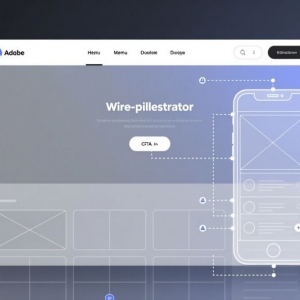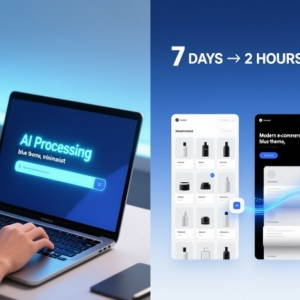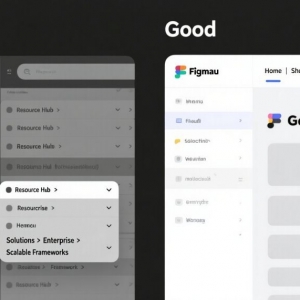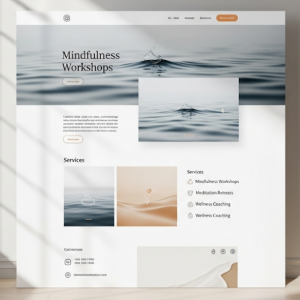Your website isn’t quite hitting the mark. Maybe it’s been up for a few years and feels outdated. Maybe it’s newer but doesn’t quite work. The design might seem tired, the navigation awkward, or you’re hesitant to share it with others.
You’re thinking about hiring a website designer, but the key question is: Do you need a full redesign or just a few adjustments to the existing setup?
This is a big decision. A complete redesign can take weeks or months and require a significant budget. Tweaking what’s already there is often faster, cheaper, and less disruptive. But choosing the wrong approach—like patching a site that needs a rebuild—can lead to wasted time and money.
Here’s how to make the right choice for your site.
Figure Out What’s Really Wrong
It’s easy to focus on what’s visible. The colors feel off. The fonts look dated. The whole thing seems stuck in the past. These are valid concerns, but they’re often not the root issue.
The real question is: How well is your site performing?
Are visitors staying or leaving quickly? Are they taking actions like signing up or purchasing? Is navigation intuitive? Does it work smoothly on mobile devices? Is updating content a constant struggle?
These deeper issues reveal whether you need a light refresh or a complete overhaul. A good website designer will start by asking these questions, not just offering a new look. If they jump straight to aesthetics, that’s a warning sign. Changes should address real problems, not just follow trends.
When a Tweak Is Enough
If your site’s core is solid, you might not need to start from scratch.
Suppose the navigation is clear, pages load quickly, and users can find what they need. The structure is strong, but the visuals need a lift. Maybe the branding feels outdated, or the design lacks modern polish.
In this case, a website designer can often refresh the existing theme. They might update the color scheme, swap out fonts, or add better images. Adjusting the layout or switching to a cleaner theme can make the site feel fresh without rebuilding everything.
This approach is quicker, more affordable, and keeps your content and strategy intact. It’s like giving your house a fresh coat of paint instead of tearing down walls.
But don’t mistake a visual fix for a structural solution. If the site’s foundation is weak, a new look won’t cut it.
When a Full Redesign Is Necessary
A full redesign goes beyond aesthetics. It’s about rethinking the site’s structure, user experience, and technology—how people interact with it and how you manage it.
You need this when your site isn’t keeping up with your needs.
Maybe your business has evolved, and the site no longer reflects your goals. Maybe it’s built on outdated tools that are slow or hard to maintain. Maybe it looks fine but isn’t driving conversions. Or maybe managing it feels like a tech nightmare.
Here are some signs you need a redesign:
- Users are confused or can’t find what they’re looking for.
- The site isn’t mobile-optimized, which is critical in 2025.
- Updating content requires constant technical help.
- The site doesn’t align with your current brand or offerings.
- It’s slow or relies on outdated tech that causes issues.
These problems can’t be fixed with a quick tweak. They require a new structure, better tools, and a fresh content strategy.
It’s a bigger investment, but it can set your site up for long-term success.
Look Beyond the Surface
A redesign isn’t just about making things prettier. It’s about improving how the site works. What’s the user journey? What’s on the homepage? What actions are you encouraging? Is the backend easy to manage?
When working with a website designer, don’t just focus on aesthetics. Share where the site is falling short and what needs to improve—for your users and your team.
Think About Your Future
Consider where your business is headed. Are you launching new products or services? Scaling up marketing? Expecting more traffic? If your site can’t support that growth—because it’s slow, inflexible, or hard to update—a tweak might not be enough. A redesign now can prevent bigger issues later.
But if your business is stable and the site’s core is functional, a lighter refresh might suffice.
How to Make the Call
If you’re unsure, don’t guess. Talk to a website designer who knows their craft. The best ones won’t just push a costly rebuild. They’ll analyze your site’s performance, ask about your goals, and recommend what makes sense—whether that’s a few tweaks or a complete redesign.
They’ll dive into the backend, look at user data, and help you spend your budget wisely.
The Bottom Line
Tweak the theme if your site’s structure is solid but needs a visual boost. Go for a full redesign if the functionality, flow, or tech isn’t up to par.
Not sure which path to take? A skilled website designer Singapore will guide you to a site that works—for your users and your business.
It’s not about chasing trends. It’s about building a tool that delivers results.











